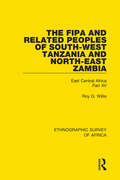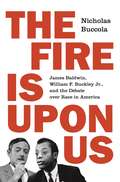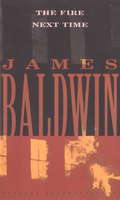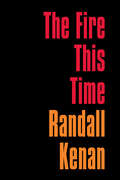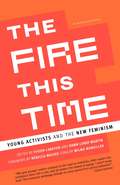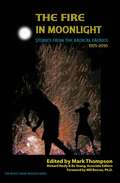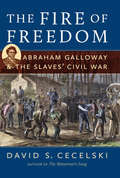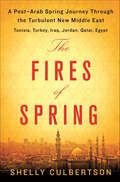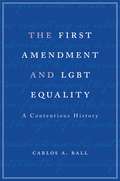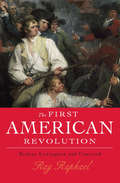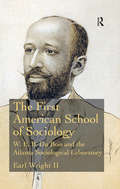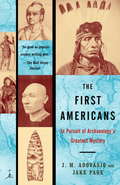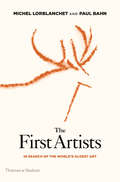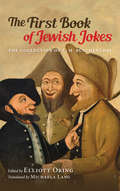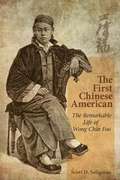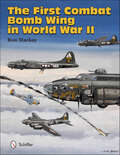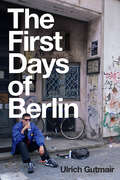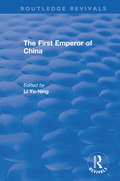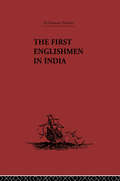- Table View
- List View
The Fipa and Related Peoples of South-West Tanzania and North-East Zambia: East Central Africa Part XV
by Roy G. WillisRoutledge is proud to be re-issuing this landmark series in association with the International African Institute. The series, published between 1950 and 1977, brings together a wealth of previously un-co-ordinated material on the ethnic groupings and social conditions of African peoples. Concise, critical and (for its time) accurate, the Ethnographic Survey contains sections as follows: Physical Environment Linguistic Data Demography History & Traditions of Origin Nomenclature Grouping Cultural Features: Religion, Witchcraft, Birth, Initiation, Burial Social & Political Organization: Kinship, Marriage, Inheritance, Slavery, Land Tenure, Warfare & Justice Economy & Trade Domestic Architecture Each of the 50 volumes will be available to buy individually, and these are organized into regional sub-groups: East Central Africa, North-Eastern Africa, Southern Africa, West Central Africa, Western Africa, and Central Africa Belgian Congo. The volumes are supplemented with maps, available to view on routledge.com or available as a pdf from the publishers.
The Fire Inside: Firefighters Talk About Their Lives
by Steve DelsohnIn the tradition of Mark Baker's Cops, more than 100 top firefighters describe the highs and lows of the world's most dangerous profession.Fascinating and packed with emotion,The Fire Inside is a unique look at the unseen world of firefighters who risk their lives for strangers every day In their own words, these male and female heroes vividly describe how they cope with scorching flame, injuries, earthquakes, hazardous waste, and wildfire-and the rewards that keep them climbing back on the fire truck.
The Fire Is upon Us: James Baldwin, William F. Buckley Jr., and the Debate over Race in America
by Nicholas BuccolaHow the clash between the civil rights firebrand and the father of modern conservatism continues to illuminate America's racial divideOn February 18, 1965, an overflowing crowd packed the Cambridge Union in Cambridge, England, to witness a historic televised debate between James Baldwin, the leading literary voice of the civil rights movement, and William F. Buckley Jr., a fierce critic of the movement and America's most influential conservative intellectual. The topic was "the American dream is at the expense of the American Negro," and no one who has seen the debate can soon forget it. Nicholas Buccola's The Fire Is upon Us is the first book to tell the full story of the event, the radically different paths that led Baldwin and Buckley to it, the controversies that followed, and how the debate and the decades-long clash between the men continues to illuminate America's racial divide today.Born in New York City only fifteen months apart, the Harlem-raised Baldwin and the privileged Buckley could not have been more different, but they both rose to the height of American intellectual life during the civil rights movement. By the time they met in Cambridge, Buckley was determined to sound the alarm about a man he considered an "eloquent menace." For his part, Baldwin viewed Buckley as a deluded reactionary whose popularity revealed the sickness of the American soul. The stage was set for an epic confrontation that pitted Baldwin's call for a moral revolution in race relations against Buckley's unabashed elitism and implicit commitment to white supremacy.A remarkable story of race and the American dream, The Fire Is upon Us reveals the deep roots and lasting legacy of a conflict that continues to haunt our politics.
The Fire Next Time: Notes Of A Native Son / Nobody Knows My Name / The Fire Next Time / No Name In The Street / The Devil Finds Work (Vintage International #1)
by James BaldwinNATIONAL BESTSELLER • The book that galvanized the nation, gave voice to the emerging civil rights movementin the 1960s—and still lights the way to understanding race in America today. • "The finest essay I&’ve ever read.&” —Ta-Nehisi CoatesAt once a powerful evocation of James Baldwin's early life in Harlem and a disturbing examination of the consequences of racial injustice, the book is an intensely personal and provocative document from the iconic author of If Beale Street Could Talk and Go Tell It on the Mountain. It consists of two "letters," written on the occasion of the centennial of the Emancipation Proclamation, that exhort Americans, both black and white, to attack the terrible legacy of racism. Described by The New York Times Book Review as "sermon, ultimatum, confession, deposition, testament, and chronicle … all presented in searing, brilliant prose," The Fire Next Time stands as a classic of literature.
The Fire This Time
by Randall Kenan&“Kenan continues Baldwin&’s legendary tradition of &‘telling it on the mountain&’ by giving a voice to the unvarnished truth.&”—The San Francisco Chronicle James Baldwin's The Fire Next Time was one of the essential books of the sixties, and one of the most galvanizing statements of the American civil rights movement. In The Fire This Time, inspired by Baldwin, Kenan combines elements of memoir and commentary, casting a critical eye from his childhood to the present to observe that, while there have been dramatic advances since the sixties, some issues continue to bedevil us. Starting with W. E. B. Du Bois and Martin Luther King, Jr., Kenan expands the discussion to include many powerful Aamerican personalities, such as Oprah Winfrey, O. J. Simpson, Clarence Thomas, Rodney King, Sean &“Puffy&” Combs, George Foreman, and Barack Obama.Published to mark the forty-fifth anniversary of James Baldwin&’s epochal work, The Fire This Time is itself a piercing consideration of the times, and an impassioned call to transcend them.
The Fire This Time: A New Generation Speaks about Race
by Jesmyn WardNational Book Award-winner Jesmyn Ward takes James Baldwin's 1963 examination of race in America, The Fire Next Time, as a jumping off point for this groundbreaking collection of essays and poems about race from the most important voices of her generation and our time.<p><p>In light of recent tragedies and widespread protests across the nation, The Progressive magazine republished one of its most famous pieces: James Baldwin's 1962 "Letter to My Nephew," which was later published in his landmark book, The Fire Next Time. Addressing his fifteen-year-old namesake on the one hundredth anniversary of the Emancipation Proclamation, Baldwin wrote: "You know and I know, that the country is celebrating one hundred years of freedom one hundred years too soon." <p>Award-winning author Jesmyn Ward knows that Baldwin's words ring as true as ever today. In response, she has gathered short essays, memoir, and a few essential poems to engage the question of race in the United States. And she has turned to some of her generation's most original thinkers and writers to give voice to their concerns. <p>The Fire This Time is divided into three parts that shine a light on the darkest corners of our history, wrestle with our current predicament, and envision a better future. Of the eighteen pieces, ten were written specifically for this volume. <p>In the fifty-odd years since Baldwin's essay was published, entire generations have dared everything and made significant progress. But the idea that we are living in the post-Civil Rights era, that we are a "post-racial" society is an inaccurate and harmful reflection of a truth the country must confront. Baldwin's "fire next time" is now upon us, and it needs to be talked about. <p>Contributors include Carol Anderson, Jericho Brown, Garnette Cadogan, Edwidge Danticat, Rachel Kaadzi Ghansah, Mitchell S. Jackson, Honoree Jeffers, Kima Jones, Kiese Laymon, Daniel Jose Older, Emily Raboteau, Claudia Rankine, Clint Smith, Natasha Trethewey, Wendy S. Walters, Isabel Wilkerson, and Kevin Young.
The Fire This Time: Young Activists and the New Feminism
by Vivien Labaton Dawn Lundy MartinYoung feminists today are becoming activists on behalf of many causes beyond the classic--and indispensable--feminist ones of reproductive rights and equal pay for equal work. InThe Fire This Time, Dawn Martin, one of four founders of The Third Wave Foundation--a multiracial, multi-issue, and multicultural activist organization--and Vivien Labaton, its first executive director, offer an exciting cross section of feminist voices that express new directions in activism, identity, and thought. Ayana Bird dissects the role of black women in hip-hop; Joshua Breitbart and Ana Noguiera demonstrate how Indimedia can break the hold of the corporate media over the news; and Jennifer Bleyer reviews the exhilarating power unleashed by the GirlZine movement. Anna Kirkland's analysis of transsexual and transgendered people and the law is deeply thoughtful, and Shireen Lee's piece on women, technology, and feminism envisions empowering prospects for women. . Ranging from media and culture to politics and globalization,The Fire This Timeis a call to new frontiers of activism, and helps reinvent feminism for a new generation. From the Trade Paperback edition.
The Fire in Moonlight: Stories from the Radical Faeries 1975-2010
by Mark Thompson Bo Young Richard NeelyAn anthology of essays by gay men who identify as Radical Faeries talking about the history of the movement and the personal influence it has had in their lives.
The Fire of Freedom
by David S. CecelskiAbraham H. Galloway (1837-1870) was a fiery young slave rebel, radical abolitionist, and Union spy who rose out of bondage to become one of the most significant and stirring black leaders in the South during the Civil War. Throughout his brief, mercurial life, Galloway fought against slavery and injustice. He risked his life behind enemy lines, recruited black soldiers for the North, and fought racism in the Union army's ranks. He also stood at the forefront of an African American political movement that flourished in the Union-occupied parts of North Carolina, even leading a historic delegation of black southerners to the White House to meet with President Lincoln and to demand the full rights of citizenship. He later became one of the first black men elected to the North Carolina legislature. Long hidden from history, Galloway's story reveals a war unfamiliar to most of us. As David Cecelski writes, "Galloway's Civil War was a slave insurgency, a war of liberation that was the culmination of generations of perseverance and faith." This riveting portrait illuminates Galloway's life and deepens our insight into the Civil War and Reconstruction as experienced by African Americans in the South.
The Fires of Philadelphia: Citizen-Soldiers, Nativists, and the1844 Riots Over the Soul of a Nation
by Zachary M. SchragA gripping and masterful account of the moment one of America's founding cities turned on itself, giving the nation a preview of the Civil War to come.America is in a state of deep unrest, grappling with xenophobia, racial, and ethnic tension a national scale that feels singular to our time. But it also echoes the earliest anti-immigrant sentiments of the country. In 1844, Philadelphia was set aflame by a group of Protestant ideologues—avowed nativists—who were seeking social and political power rallied by charisma and fear of the immigrant menace. For these men, it was Irish Catholics they claimed would upend morality and murder their neighbors, steal their jobs, and overturn democracy. The nativists burned Catholic churches, chased and beat people through the streets, and exchanged shots with a militia seeking to reinstate order. In the aftermath, the public debated both the militia&’s use of force and the actions of the mob. Some of the most prominent nativists continued their rise to political power for a time, even reaching Congress, but they did not attempt to stoke mob violence again. Today, in an America beset by polarization and riven over questions of identity and law enforcement, the 1844 Philadelphia Riots and the circumstances that caused them demand new investigation. At a time many envision America in flames, The Fires of Philadelphia shows us a city—one that embodies the founding of our country—that descended into open warfare and found its way out again.
The Fires of Spring: A Post-Arab Spring Journey Through the Turbulent New Middle East—Tunisia, Turkey, Iraq, Qatar, Jordan, Egypt
by Shelly CulbertsonTurkey, Iraq, Qatar, Jordan, Egypt, and TunisiaThe “Arab Spring” all started when a young Tunisian fruit seller set himself on fire in protest of a government official confiscating his apples and slapping his face. The aftermath of that one personal protest grew to become the Middle East movement known as the Arab Spring—a wave of disparate events that included protests, revolutions, hopeful reform movements, and bloody civil wars.The Fires of Spring is the first book to bring the post-Arab Spring world to light in a holistic context. A narrative of author Shelly Culbertson’s journey through six countries of the Middle East, The Fires of Spring tells the story by weaving together a sense of place, insight about issues of our time, interviews with leaders, history, and personal stories. Culbertson navigates the nuances of street life and peers into ministries, mosques, and women’s worlds. She delves into what Arab Spring optimism was about, and at the same time sheds light on the pain and dysfunction that continues to plague parts of the region. The Fires of Spring blends reportage, travel memoir, and analysis in this complex and multifaceted portrait.
The First Amendment and LGBT Equality: A Contentious History
by Carlos A. BallCarlos A. Ball argues that as progressives fight the First Amendment claims of religious conservatives and other LGBT opponents, they should take care not to forget the crucial role the First Amendment played in the early decades of the movement, and not to erode the safeguards of liberty that allowed LGBT rights to exist in the first place.
The First Amendment and LGBT Equality: A Contentious History
by Carlos A. BallCarlos A. Ball argues that as progressives fight the First Amendment claims of religious conservatives and other LGBT opponents, they should take care not to forget the crucial role the First Amendment played in the early decades of the movement, and not to erode the safeguards of liberty that allowed LGBT rights to exist in the first place.
The First American Revolution: Before Lexington and Concord
by Ray RaphaelThe original rebels: &“Brings into clear focus events and identities of ordinary people who should share the historic limelight with the Founding Fathers.&” —Publishers Weekly According to the traditional telling, the American Revolution began with &“the shot heard &’round the world.&” But the people started taking action earlier than many think. The First American Revolution uses the wide-angle lens of a people&’s historian to tell a surprising new story of America&’s revolutionary struggle. In the years before the battle of Lexington and Concord, local people—men and women of common means but of uncommon courage—overturned British authority and declared themselves free from colonial oppression, with acts of rebellion that long predated the Boston Tea Party. In rural towns such as Worcester, Massachusetts, democracy set down roots well before the Boston patriots made their moves in the fight for independence. Richly documented, The First American Revolution recaptures in vivid detail the grassroots activism that drove events in the years leading up to the break from Britain.
The First American School of Sociology: W.E.B. Du Bois and the Atlanta Sociological Laboratory
by Earl Wright IIThis book offers an original and rounded examination of the origin and sociological contributions of one of the most significant, yet continuously ignored, programs of social science research ever established in the United States: the Atlanta Sociological Laboratory. Under the leadership of W.E.B. Du Bois, this unit at Atlanta University made extensive contributions to the discipline which, as the author demonstrates, extend beyond 'race studies' to include founding the first American school of sociology, establishing the first program of urban sociological research, conducting the first sociological study on religion in the United States, and developing methodological advances that remain in use today. However, all of these accomplishments have subsequently been attributed, erroneously, to White sociologists at predominately White institutions, while the Atlanta Sociological Laboratory remains sociologically ignored and marginalized. Placing the achievements of the Du Bois led Atlanta Sociological Laboratory in context, the author contends that American Jim Crow racism and segregation caused the school to become marginalized and ignored instead of becoming recognized as one the most significant early departments of sociology in the United States. Illuminating the sociological activities - and marginalization - of a group of African American scholars from a small African American institution of higher learning in the Deep South - whose works deserve to be canonized alongside those of their late nineteenth and early twentieth century peers - this book will appeal to all scholars with interests in the history of sociology and its development as a discipline, race and ethnicity, research methodology, the sociology of the south, and urban sociology.
The First Americans: In Pursuit of Archaeology's Greatest Mystery
by Jake Page James AdovasioJ. M. Adovasio has spent the last thirty years at the center of one of our most fiery scientific debates: Who were the first humans in the Americas, and how and when did they get there? At its heart, The First Americans is the story of the revolution in thinking that Adovasio and his fellow archaeologists have brought about, and the firestorm it has ignited. As he writes, "The work of lifetimes has been put at risk, reputations have been damaged, an astounding amount of silliness and even profound stupidity has been taken as serious thought, and always lurking in the background of all the argumentation and gnashing of tenets has been the question of whether the field of archaeology can ever be pursued as a science."From the Trade Paperback edition.
The First Artists: In Search Of The World's Oldest Art
by Paul Bahn Michel Lorblanchet Pierre SoulagesTwo of the greatest living authorities on Ice Age art delve hundreds of thousands of years into the human past to discover the earliest works of art ever made, drawing on decades of new research Where is the world’s very first art located? When, and why, did people begin experimenting with different materials, forms, and colors? Prehistorians have long been asking these questions, but only recently have they been able to piece together the first chapter in the story of art. Overturning the traditional Eurocentric vision of our artistic origins, Paul Bahn and Michel Lorblanchet seek out the earliest art across the whole world. There are clues that even three million years ago distant human ancestors were drawn to natural curiosities that appeared representational, such as the face-like “Makapansgat cobble" from South Africa, not carved but naturally weathered to resemble a human face. In the last hundred thousand years people all over the world began to create art: the oldest known paint palettes in South Africa’s Blombos Cave, the famous Venus figures across Europe all the way to Siberia, and magnificent murals on cave walls in every continent except Antarctica. This book is the first to assess the discovery, history, and significance of these varied forms of art: the artistic impulse developed in the human mind wherever it traveled.
The First Boat People
by S. G. WebbThe First Boat People, first published in 2006, concerns how people travelled across the world to Australia in the Pleistocene. It traces movement from Africa to Australia, offering a new view of population growth at that time, challenging current ideas, and underscoring problems with the 'Out of Africa' theory of how modern humans emerged. The variety of routes, strategies and opportunities that could have been used by those first migrants is proposed against the very different regional geography that existed at that time. Steve Webb shows the impact of human entry into Australia on the megafauna using fresh evidence from his work in Central Australia, including a description of palaeoenvironmental conditions existing there during the last two glaciations. He argues for an early human arrival and describes in detail the skeletal evidence for the first Australians. This is a stimulating account for students and researchers in biological anthropology, human evolution and archaeology.
The First Book of Jewish Jokes: The Collection of L. M. Büschenthal
by Elliott Oring Anastasiya Astapova Tsafi Sebba-Elran Dan Ben-Amos Larisa Privalskaya Ilze Akerbergs Michaela LangWorks on Jewish humor and Jewish jokes abound today, but what formed the basis for our contemporary notions of Jewish jokes? How and when did these perceptions develop? In this groundbreaking study and translation, noted humor and folklore scholar Elliott Oring introduces us to the joke collections of Lippmann Moses Büschenthal, an enlightened rabbi, and an unknown author writing as "Judas Ascher." Originally published in German in 1812 and 1810, these books include jokes and anecdotes that play on stereotypes. The jokes depict Jews dealing with Gentiles who are bent on their conversion, Jews encountering government officials and institutions, newly propertied Jews attempting to demonstrate their acquisition of artistic and philosophical knowledge, and Jews engaged in trade and moneylending—often with the aim to defraud. In these jokes we see the antecedents of modern Jewish humor, and in Büschenthal’s brief introduction we find perhaps the earliest theory of the Jewish joke. Oring provides helpful annotations for the jokes and contextualizing essays that examine the current state of Jewish joke scholarship and the situation of the Jews in France and Germany leading up to the periods when the two collections were published. Intended to stimulate the search for even earlier examples, Oring challenges us to confront the Jewish joke from a genuine historical perspective.
The First Cell: And the Human Costs of Pursuing Cancer to the Last
by Azra RazaA world-class oncologist's devastating and deeply personal examination of cancerWe have lost the war on cancer. We spend $150 billion each year treating it, yet -- a few innovations notwithstanding -- a patient with cancer is as likely to die of it as one was fifty years ago. Most new drugs add mere months to one's life at agonizing physical and financial cost.In The First Cell, Azra Raza offers a searing account of how both medicine and our society (mis)treats cancer, how we can do better, and why we must. A lyrical journey from hope to despair and back again, The First Cell explores cancer from every angle: medical, scientific, cultural, and personal. Indeed, Raza describes how she bore the terrible burden of being her own husband's oncologist as he succumbed to leukemia. Like When Breath Becomes Air, The First Cell is no ordinary book of medicine, but a book of wisdom and grace by an author who has devoted her life to making the unbearable easier to bear.
The First Chinese American
by Scott D. SeligmanChinese in America endured abuse and discrimination in the late nineteenth century, but they had a leader and a fighter in Wong Chin Foo (1847-1898), whose story is a forgotten chapter in the struggle for equal rights in America. <P><P>The first to use the term 'Chinese American,' Wong defended his compatriots against malicious scapegoating and urged them to become Americanized to win their rights. A trailblazer and a born showman who proclaimed himself China's first Confucian missionary to the United States, he founded America's first association of Chinese voters and testified before Congress to get laws that denied them citizenship repealed. <P><P>Wong challenged Americans to live up to the principles they freely espoused but failed to apply to the Chinese in their midst. This evocative biography is the first book-length account of the life and times of one of America's most famous Chinese - and one of its earliest campaigners for racial equality.
The First Combat Bomb Wing in WWII
by Ron MackayThis is a study of one of the 8th USAAF’s sub-units. The 1st Combat Bomb Wing (1CBW), created on 13 September 1943, was preceded first by the 1st Bomb Wing, and then the 101st Provisional Bomb Wing, which included the 91BG as an element. By then, the 91BG was joined by the 351BG and 381BG, with the 351BG later displaced by the 398BG. The operational experience of these units virtually spanned the entire 33 months of the "Mighty Eighth’s" existence and the often costly but finally successful campaign to deny Hitler’s Germany the means with which to pursue its warped dreams of conquest.
The First Days of Berlin: The Sound of Change
by Ulrich GutmairBerlin in the early 1990s, right after the fall of the Berlin Wall: this is the place to be. Berlin-Mitte, the central district of the city, with its wastelands and decaying houses, has become the centre of a new movement. Artists, musicians, squatters, club owners, DJs and ravers are reclaiming the old city centre and bringing it back to life. This interregnum between two systems – the collapse of the old East Germany, the gentrification of the new Berlin – lasts only a few years. West Berliners, East Berliners and new residents from abroad join together to create music, art and fashion, to open bars and clubs and galleries, even if only for a few weeks. In the months following the fall of the Wall, there is a feeling of new beginnings and immense possibilities: life is now, and to be in the here and now feels endless. The phrase ‘temporary autonomous zone’ is circulating, it describes the idea – romantic and naive but, in the circumstances, not absurd – that, at a certain moment in history, you can actually do whatever you want. Ulrich Gutmair moved to West Berlin as a student in autumn 1989: two weeks later the Wall came down. He spent the next few years studying during the day in the West and exploring the squats, bars and techno clubs in the East at night. He fell in love with House and Techno and raved at Tresor, Elektro, Bunker and many other places that in the meantime have almost disappeared from collective memory. Ten years later he decided to write a book about that period in between, when one regime was brought down and a new one wasn’t yet established. When utopia was actually a place to inhabit for a moment.
The First Emperor of China (Routledge Revivals)
by Li Yu-NingThis title was first published in 1975. The long history of China has produced many outstanding rulers, but few as significant as Ch'in Shih-huang, the first emperor of China. When he ascended the royal throne of Ch'in as King Cheng in 246 B.C., the territory of China was divided among several rival kingdoms, the last of a large number of states which had been engaged in almost uninterrupted warfare for centuries. Through a combination of warfare, diplomacy, and intrigue, King Cheng successively annihilated the rival six states, destroying the last in 221 B.C. Since 1972 a radically different official view of the First Emperor has been given prominence throughout China. Now he is seen as a farsighted ruler who destroyed the forces which had kept China divided, unified the nation, and established the first centralized state in Chinese history. This phenomenon prompts students of Chinese history and politics alike to ask; Is this only a historical controversy ? If not, what might be the motivation behind this movement? It is hoped that the materials in this volume, in addition to providing a representative sampling of the current reinterpretation of Ch'in Shih-huang, may also be helpful in formulating answers to the above and more questions.
The First Englishmen in India: Letters and Narratives of Sundry Elizabethans written by themselves
by J Courtenay LockeFirst published in 1930. This volume contains letters and narratives of some of the Elizabethans who went to India. Here the beginnings of the British Indian Empire can be seen, arising out of the trading operations of the East India Company.
